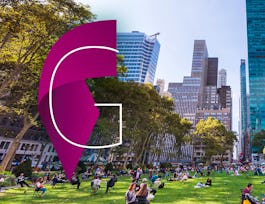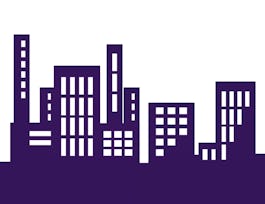Sustainability, Resilience and Efficiency are fundamental considerations for city managers in managing urban infrastructures. Today, more than 3.9 billion people, making up more than 54% of the global population, live in cities. Urbanization is expected to continue in the coming years, raising the urban population to 6.0 billion by 2045. This dramatic increase in urban populations will inevitably increase the demand for energy, mobility (transportation), water, and other urban services in every city around the world. Without functional governance and management structures that ensure efficient, resilient and sustainable performance in cities, the current urbanization growth might become a catastrophic risk threatening the quality of life of the humanity.


Management of Urban Infrastructures – part 1
Taught in English
Some content may not be translated
30,459 already enrolled
(765 reviews)
Skills you'll gain
Details to know

Add to your LinkedIn profile
9 quizzes
See how employees at top companies are mastering in-demand skills


Earn a career certificate
Add this credential to your LinkedIn profile, resume, or CV
Share it on social media and in your performance review

There are 5 modules in this course
Welcome to the 1st block: an Introduction to Urban Infrastructures. In this block we will start by exploring the key challenges faced by urban infrastructures (1-2), and then we will learn about the main urban infrastructure systems (1-3), and their main dimensions (1-4). Finally, Mr. Vincent Lusser will provide us with a practitioner’s perspective on urban infrastructures (1-5). To complete this block, first watch the five videos, and visit the discussion forum where other learners and our TA team will answer any questions and facilitate a debate on the concepts treated in the section. After watching the videos, make sure to read the reading assigned for the block. In it, you will find a summary of the lecture content, and an illustrative case study of the urban infrastructure challenges facing Mexico City, the largest urban agglomeration in the Western hemisphere. Finally, when you feel ready, complete the quiz “What did I learn in Block 1?” to assess your knowledge, and Short Answer Assignment 1, to apply what you have learned to your own city.
What's included
6 videos2 readings2 quizzes1 discussion prompt1 plugin
Welcome to the 2nd block: an Introduction to Principles of Urban Infrastructure Management. In this block, we first answer the question: “What do urban infrastructure managers do?” (2-1), and then we study how to manage different stakeholders and their associated performance objectives (2-2). Next, we will learn about the main dimensions for urban infrastructure management (2-3), the main schools of thought in managing urban infrastructure systems (2-4), and we will finish with an interview with Mr. Christoph Rothballer, from Boston Consulting Group (2-5). Once you have watched the five videos in this block, you may want to visit the discussion forums where you can express your doubts and debate the contents of the lectures. In the 2nd block reading, you will find a summary of the lecture content, and a dramatic illustrative case study that explores the challenges in supplying drinking water in Detroit. Finally, asses your knowledge of the block’s concepts in the quiz “What did I learn in Block 2?”, and answer the Short Answer Assignment 2 to explore how the concepts apply to your city.
What's included
6 videos1 reading2 quizzes1 discussion prompt1 plugin
Welcome to the 3rd block: an Introduction to Urban Energy Management. We now move into the two last blocks, which deal with specific urban infrastructure systems, in this case, the urban electricity system. First we will be introduced to urban energy infrastructures (3-1), we will then move on to understanding urban electricity systems (3-2). We will then learn how to manage urban electricity systems (3-3) and discover what challenges and opportunities must be confronted (3-4). Finally, an interview with Mr. Thierry Clement, from Veolia, will provide us with the perspective of a leading utility firm (3-5). After watching the five videos in this block, visit the discussion forums to solve your doubts or express your thoughts on the lecture content. In the 3rd block reading you will find a summary of the lecture content, and an illustrative case study exploring the transition towards a sustainable urban energy system in Copenhagen. Finally, test your knowledge of the block’s concepts in the quiz “What did I learn in Block 3?”, and answer Short Answer Assignment 3 and discover the urban electricity system in your city.
What's included
5 videos1 reading2 quizzes1 discussion prompt1 plugin
Welcome to the 4th block: an Introduction to Urban Transport Management. In this block, we will study the ever-important urban transportation system. We will begin with an introduction to urban transportation systems (4-1), and then we will learn how to manage urban transportation systems (4-2). Prof. Robert E. Paaswell, from the City University of New York, will lecture us on the challenges of managing urban transport (4-3), and Mr. Beat Muller, from CarPostal, will complement Prof. Paaswell’s views, but from the practitioner perspective (4-4). Finally we will address the broader challenges of urban transportation (4-5), and conclude the MOOC with a short wrap up (4-6). After watching the six intense videos in this block, go visit the discussion forums to solve any doubts or simply share your comments on the topic of the lecture. You will find a summary of the content, as well as an illustrative case study on the revolutionary transformation of Seoul’s transport system in the 4th block reading. To conclude the block, test your knowledge in the quiz “What did I learn in Block 4?”, and answer Short Answer Assignment 4 to investigate how the concepts on urban transportation apply to your city.
What's included
6 videos1 reading2 quizzes1 discussion prompt1 plugin
You are almost done! The last step to finish the required coursework of this MOOC is to take the final exam. We also encourage you to take on the optional challenge of writing a peer-reviewed case study about your own city to win the big prize of the MUI MOOC !
What's included
1 reading1 quiz1 peer review1 discussion prompt
Instructor

Offered by
Recommended if you're interested in Leadership and Management

École Polytechnique Fédérale de Lausanne

University of Virginia Darden School Foundation

University of Toronto

University of Copenhagen
Why people choose Coursera for their career




Learner reviews
Showing 3 of 765
765 reviews
- 5 stars
72.02%
- 4 stars
23%
- 3 stars
4.05%
- 2 stars
0.26%
- 1 star
0.65%
New to Leadership and Management? Start here.

Open new doors with Coursera Plus
Unlimited access to 7,000+ world-class courses, hands-on projects, and job-ready certificate programs - all included in your subscription
Advance your career with an online degree
Earn a degree from world-class universities - 100% online
Join over 3,400 global companies that choose Coursera for Business
Upskill your employees to excel in the digital economy
Frequently asked questions
Access to lectures and assignments depends on your type of enrollment. If you take a course in audit mode, you will be able to see most course materials for free. To access graded assignments and to earn a Certificate, you will need to purchase the Certificate experience, during or after your audit. If you don't see the audit option:
The course may not offer an audit option. You can try a Free Trial instead, or apply for Financial Aid.
The course may offer 'Full Course, No Certificate' instead. This option lets you see all course materials, submit required assessments, and get a final grade. This also means that you will not be able to purchase a Certificate experience.
When you purchase a Certificate you get access to all course materials, including graded assignments. Upon completing the course, your electronic Certificate will be added to your Accomplishments page - from there, you can print your Certificate or add it to your LinkedIn profile. If you only want to read and view the course content, you can audit the course for free.
You will be eligible for a full refund until two weeks after your payment date, or (for courses that have just launched) until two weeks after the first session of the course begins, whichever is later. You cannot receive a refund once you’ve earned a Course Certificate, even if you complete the course within the two-week refund period. See our full refund policy.


